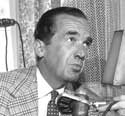Edward Murrow
(1908 - 1965)

Edward Murrow was a celebrated and reputable reporter and journalist who covered the rise of Nazi Germany and the atrocities of the Holocaust.
In 1935, Murrow was hired by CBS to set up a network of correspondents in Europe. He arrived in Germany shortly before the Nuremberg Laws went into effect. Murrow interviewed ousted Jewish professors about the situation and their academic repression. As he interviewed and wrote reports, he also scouted the area for possible speakers for a CBS radio show. He flew to London in 1937 with an address book filled with reputable contacts. He became a director for CBS and hired William Shirer to start his radio show.
Murrow proceeded to round up correspondents all over Europe, a hard task due to the Nazi party’s strict censorship. He and his reporters recorded the mass arrests, killings, and suicides taking place in Vienna after Germany annexed Austria in 1938. While in Vienna, Murrow also reported on the looting of the Rothschild mansion. From November 7, 1940 to May 11, 1941, after the outbreak of WWII, Murrow reported the horrific bombings and flying shrapnel that plagued London. Murrow brought descriptions of the war to American audiences like no other journalist of the time. He reported on the mass killings occurring in concentration camps and in pits in the woods, the beatings and shootings on the street, and the looting and robbing of stores and businesses of Jews. He reported on the ruthless efficiency of the rounding up of Jews from countries throughout Europe, and the humanitarian crisis in the ghettoes. When Buchenwald was liberated, Murrow was one of the first to report on the grotesque and horrific sight of the emaciated and dead bodies littering the camp. His integrity and sense of morality drove him to report what few others were reporting at the time to an audience that too often turned an apathetic ear.
Murrow continued his esteemed journalism career after the war. He began his television show, See It Now, in 1951 as an adaptation of his radio show, Hear it Now. On the show, he produced an episode called “Egypt-Israel” that was an hour-long look into the conflict in the region. His opinion objective and informed, Murrow presented the multifaceted situation in the Middle East with class and intellect. The episode was received with respect from both sides and impartial American audiences.
Sources: Moment, The Museum of Broadcast Communication, PBS


